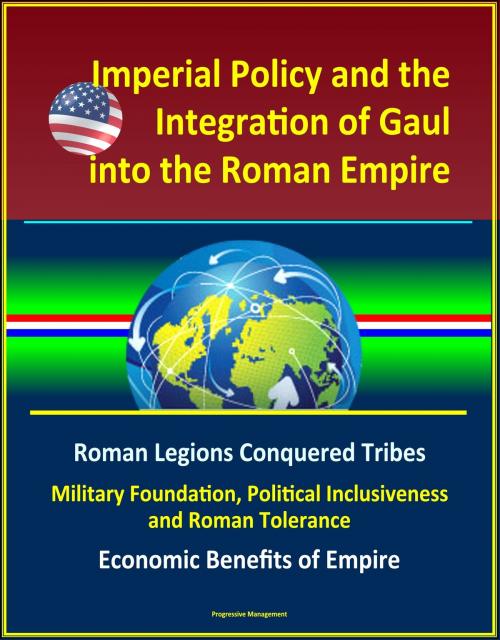Imperial Policy and the Integration of Gaul into the Roman Empire: Roman Legions Conquered Tribes, Military Foundation, Political Inclusiveness and Roman Tolerance, Economic Benefits of Empire
Nonfiction, History, Ancient History, Rome, Military, Strategy| Author: | Progressive Management | ISBN: | 9781370962365 |
| Publisher: | Progressive Management | Publication: | January 23, 2017 |
| Imprint: | Smashwords Edition | Language: | English |
| Author: | Progressive Management |
| ISBN: | 9781370962365 |
| Publisher: | Progressive Management |
| Publication: | January 23, 2017 |
| Imprint: | Smashwords Edition |
| Language: | English |
This excellent report has been professionally converted for accurate flowing-text e-book format reproduction. Unusual among the great states of antiquity, Rome managed to integrate many of the people it conquered into the very fabric of its society. Rome won and maintained loyalties by expertly leveraging a combination of what is today called hard and soft power. Undeniably important to the overall outcome were the military garrisons that enforced the writ of the state. But while the Army ensured compliance, the economic and cultural benefits of imperial life made recently conquered people willing participants in the life of the empire. Rome's generous granting of citizenship ensured conquered leaders could advance politically inside the empire. In the case of Gaul, the elite was largely coopted to the Roman project in a generation, though sporadic civil disturbances never fully disappeared. This thesis examines how the people of Gaul became integrated into the Roman world. It is a fascinating topic in its own right, but more importantly, may offer insight into future operations where the United States struggles to integrate formerly hostile nations into the American world order.
Rome is relevant. Two millennia before the US engineered the fall of Kabul and the American occupation of Baghdad, Roman legions conquered the once mighty tribes of Gaul. The circumstances separating these campaigns are great of course, but meaningful similarities abound. Then as now a defeated population needed to be fed, secured, and controlled until it could care for itself and accept a new imposed order. Economies were reshaped and cultures clashed. But Rome was able, for centuries, to enjoy the fruits of those efforts. Its success was made possible by a Gallic population that ultimately accepted its place in a re-ordered world.
The successful integration of Gaul into Rome's Empire stands in stark contrast to the muddled results of more recent attempts at remolding societies. In Iraq and Afghanistan, populations were less willing than the Gallic tribes to accept imposed changes and accept their status as conquered people. They were also less optimistic than the Gauls about the potential benefits of their defeat. The following chapters explore the factors that led to Rome's success. They also attempt to illustrate that Gallic integration was the result of a very specific mix of Roman policies and actions, one that suggests a formula for occupation and nation-building: Demonstrate extreme violence in war; offer benevolence and mercy in peace; ensure widely distributed economic development; be accepting of local culture; offer a path to political power in the new system; rule by local proxy; maintain as much as possible of the status-quo; and ensure a living standard higher than what previously existed. Rome did each of these things and succeeded.
This excellent report has been professionally converted for accurate flowing-text e-book format reproduction. Unusual among the great states of antiquity, Rome managed to integrate many of the people it conquered into the very fabric of its society. Rome won and maintained loyalties by expertly leveraging a combination of what is today called hard and soft power. Undeniably important to the overall outcome were the military garrisons that enforced the writ of the state. But while the Army ensured compliance, the economic and cultural benefits of imperial life made recently conquered people willing participants in the life of the empire. Rome's generous granting of citizenship ensured conquered leaders could advance politically inside the empire. In the case of Gaul, the elite was largely coopted to the Roman project in a generation, though sporadic civil disturbances never fully disappeared. This thesis examines how the people of Gaul became integrated into the Roman world. It is a fascinating topic in its own right, but more importantly, may offer insight into future operations where the United States struggles to integrate formerly hostile nations into the American world order.
Rome is relevant. Two millennia before the US engineered the fall of Kabul and the American occupation of Baghdad, Roman legions conquered the once mighty tribes of Gaul. The circumstances separating these campaigns are great of course, but meaningful similarities abound. Then as now a defeated population needed to be fed, secured, and controlled until it could care for itself and accept a new imposed order. Economies were reshaped and cultures clashed. But Rome was able, for centuries, to enjoy the fruits of those efforts. Its success was made possible by a Gallic population that ultimately accepted its place in a re-ordered world.
The successful integration of Gaul into Rome's Empire stands in stark contrast to the muddled results of more recent attempts at remolding societies. In Iraq and Afghanistan, populations were less willing than the Gallic tribes to accept imposed changes and accept their status as conquered people. They were also less optimistic than the Gauls about the potential benefits of their defeat. The following chapters explore the factors that led to Rome's success. They also attempt to illustrate that Gallic integration was the result of a very specific mix of Roman policies and actions, one that suggests a formula for occupation and nation-building: Demonstrate extreme violence in war; offer benevolence and mercy in peace; ensure widely distributed economic development; be accepting of local culture; offer a path to political power in the new system; rule by local proxy; maintain as much as possible of the status-quo; and ensure a living standard higher than what previously existed. Rome did each of these things and succeeded.















